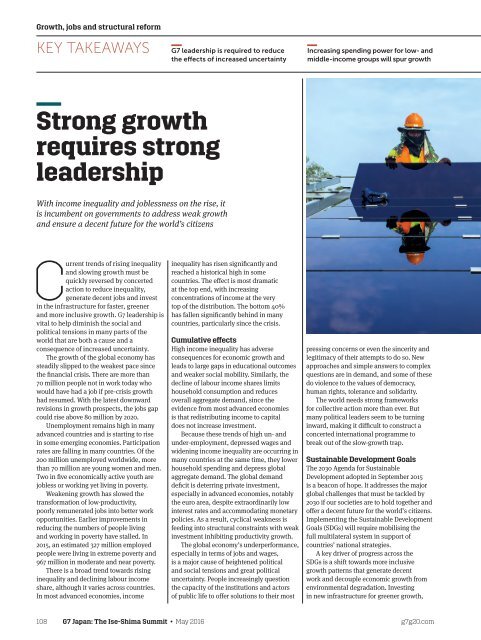G7_JAPAN
Create successful ePaper yourself
Turn your PDF publications into a flip-book with our unique Google optimized e-Paper software.
Growth, jobs and structural reform<br />
KEY TAKEAWAYS<br />
<strong>G7</strong> leadership is required to reduce<br />
the effects of increased uncertainty<br />
Increasing spending power for low- and<br />
middle-income groups will spur growth<br />
Strong growth<br />
requires strong<br />
leadership<br />
With income inequality and joblessness on the rise, it<br />
is incumbent on governments to address weak growth<br />
and ensure a decent future for the world’s citizens<br />
Current trends of rising inequality<br />
and slowing growth must be<br />
quickly reversed by concerted<br />
action to reduce inequality,<br />
generate decent jobs and invest<br />
in the infrastructure for faster, greener<br />
and more inclusive growth. <strong>G7</strong> leadership is<br />
vital to help diminish the social and<br />
political tensions in many parts of the<br />
world that are both a cause and a<br />
consequence of increased uncertainty.<br />
The growth of the global economy has<br />
steadily slipped to the weakest pace since<br />
the financial crisis. There are more than<br />
70 million people not in work today who<br />
would have had a job if pre-crisis growth<br />
had resumed. With the latest downward<br />
revisions in growth prospects, the jobs gap<br />
could rise above 80 million by 2020.<br />
Unemployment remains high in many<br />
advanced countries and is starting to rise<br />
in some emerging economies. Participation<br />
rates are falling in many countries. Of the<br />
200 million unemployed worldwide, more<br />
than 70 million are young women and men.<br />
Two in five economically active youth are<br />
jobless or working yet living in poverty.<br />
Weakening growth has slowed the<br />
transformation of low-productivity,<br />
poorly remunerated jobs into better work<br />
opportunities. Earlier improvements in<br />
reducing the numbers of people living<br />
and working in poverty have stalled. In<br />
2015, an estimated 327 million employed<br />
people were living in extreme poverty and<br />
967 million in moderate and near poverty.<br />
There is a broad trend towards rising<br />
inequality and declining labour income<br />
share, although it varies across countries.<br />
In most advanced economies, income<br />
inequality has risen significantly and<br />
reached a historical high in some<br />
countries. The effect is most dramatic<br />
at the top end, with increasing<br />
concentrations of income at the very<br />
top of the distribution. The bottom 40%<br />
has fallen significantly behind in many<br />
countries, particularly since the crisis.<br />
Cumulative effects<br />
High income inequality has adverse<br />
consequences for economic growth and<br />
leads to large gaps in educational outcomes<br />
and weaker social mobility. Similarly, the<br />
decline of labour income shares limits<br />
household consumption and reduces<br />
overall aggregate demand, since the<br />
evidence from most advanced economies<br />
is that redistributing income to capital<br />
does not increase investment.<br />
Because these trends of high un- and<br />
under-employment, depressed wages and<br />
widening income inequality are occurring in<br />
many countries at the same time, they lower<br />
household spending and depress global<br />
aggregate demand. The global demand<br />
deficit is deterring private investment,<br />
especially in advanced economies, notably<br />
the euro area, despite extraordinarily low<br />
interest rates and accommodating monetary<br />
policies. As a result, cyclical weakness is<br />
feeding into structural constraints with weak<br />
investment inhibiting productivity growth.<br />
The global economy’s underperformance,<br />
especially in terms of jobs and wages,<br />
is a major cause of heightened political<br />
and social tensions and great political<br />
uncertainty. People increasingly question<br />
the capacity of the institutions and actors<br />
of public life to offer solutions to their most<br />
pressing concerns or even the sincerity and<br />
legitimacy of their attempts to do so. New<br />
approaches and simple answers to complex<br />
questions are in demand, and some of these<br />
do violence to the values of democracy,<br />
human rights, tolerance and solidarity.<br />
The world needs strong frameworks<br />
for collective action more than ever. But<br />
many political leaders seem to be turning<br />
inward, making it difficult to construct a<br />
concerted international programme to<br />
break out of the slow-growth trap.<br />
Sustainable Development Goals<br />
The 2030 Agenda for Sustainable<br />
Development adopted in September 2015<br />
is a beacon of hope. It addresses the major<br />
global challenges that must be tackled by<br />
2030 if our societies are to hold together and<br />
offer a decent future for the world’s citizens.<br />
Implementing the Sustainable Development<br />
Goals (SDGs) will require mobilising the<br />
full multilateral system in support of<br />
countries’ national strategies.<br />
A key driver of progress across the<br />
SDGs is a shift towards more inclusive<br />
growth patterns that generate decent<br />
work and decouple economic growth from<br />
environmental degradation. Investing<br />
in new infrastructure for greener growth,<br />
108 <strong>G7</strong> Japan: The Ise-Shima Summit • May 2016 g7g20.com
















